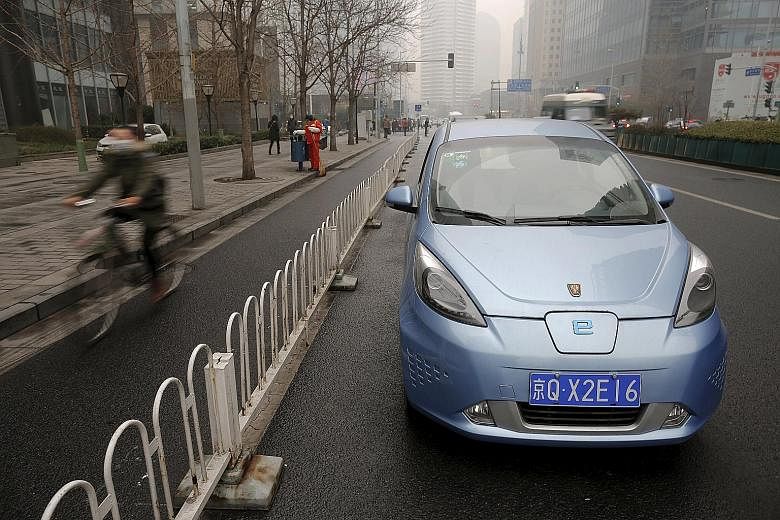Frustrated with Beijing's driving restrictions that forced her to leave her car at home a day every week, Ms Luo Xiaoping decided to do away with the inconvenience once and for all.
Last August, she forked out some 200,000 yuan (S$43,500) for a Nissan electric car - a vehicle segment excluded from the driving ban - amid the Chinese capital's efforts to clean up its dirty air.
"It costs about 80,000 yuan more than a normal car of a similar (mid-range) class but at least I wouldn't have to deal with the inconvenience any more, especially with ferrying kids around or in times of emergencies," the accountant said. "I also saw it as doing my part to clean up Beijing's terrible smog problem."
While electric cars often bring to mind Tesla Motors' sleek sedans costing six-figure sums, across an ocean from the carmaker's California plant might be where the future of electrified transportation is being determined.
China, already the world's largest car market since 2009, claimed pole position for electric car sales last year with about 220,000 to 250,000 units sold, eclipsing sales of about 180,000 in the US, according to the China Association of Automobile Manufacturers.
Chinese firm BYD, backed by American businessman Warren Buffett's Berkshire Hathaway, sold more than 61,000 electric cars last year, the majority of them in China, making it the top-selling electric carmaker. And local carmaker Geely Automobile in November said it would target new-energy vehicles to make up 90 per cent of its sales by 2020.
This explosive growth on the back of government incentives - such as billions of yuan in subsidies and tax cuts - and crippling urban smog gave China the title of the world's largest market for the first time, a remarkable turnaround for the industry that sold a paltry 2,338 electric vehicles in 2011.
Under rules to limit pollution, cars are banned from Beijing's streets one weekday per week. But electric cars are exempt and also not required to be part of a licence plate lottery system. Moreover, buyers of electric cars can get as much as 55,000 yuan in central government subsidies now.
But experts say investigations last week into fraudulent subsidy claims by carmakers have led to scepticism over the competitiveness of China's green cars and questions over whether technological breakthroughs are really being made.
Media reports surfaced last month over poor-quality electric cars being made and then "sold" to the carmaker's own car rental agency - but kept unused in warehouses instead - as the firm collected millions of yuan in subsidies.
A conventional vehicle once installed with new energy batteries can get up to 100,000 yuan in subsidies, much higher than its actual cost, The Economic Observer newspaper reported.
The controversy has drawn attention to whether China's electric car sector can be commercially viable, throwing the spotlight on subsidies in particular, which while credited for giving the sector its initial boost, are now blamed for crippling it.
Finance Minister Lou Jiwei said last month that while China's new energy industry is not a late starter, it still lacks breakthroughs in high-end products and core technology. "A big reason is that carmakers rely too heavily on subsidies and fail to keep up their own spirit of perseverance and innovation," he noted.
An editorial by the state-run China Daily last week also stressed the need for local carmakers to "sharpen the competitive edge of their cars", and for the authorities to better police the use of public funds.
Already, Mr Lou has announced plans to gradually cut subsidies for electric cars and to stop providing financial assistance after 2020.
"The government has heeded the bitter lessons from the rapid growth of the photovoltaic industry in China on the back of hefty subsidies and the huge losses the sector suffered as a result of oversupply," the editorial said.
"Domestic producers' heavy dependence on subsidies also calls for early actions to reduce government aid for those focusing on low-technology (electric) cars."
But experts say that while reducing subsidies will help weed out low-tech firms, Beijing needs to do more to nudge the domestic electric car sector in the right direction so that its long-term outlook takes precedence over short-term gains.
Subsidies, for instance, should be put towards research and development grants instead, such as improving battery life or raising the car's top speed, some suggest.
Professor Jiang Libiao of the South China University of Technology in Guangzhou has warned that China's electric car industry is at risk of making the same mistakes as the traditional car segment.
"Having the title as the largest market means nothing. China has topped traditional car sales since 2009, yet the domestic auto industry is not known for its technology.
"And now, even its market has been taken over by foreign cars because local cars are not known for their quality," he said.
"What is important now is for large Chinese auto firms, possibly under Beijing's leadership, to take a longer-term perspective and pool their resources to invest in R&D specific to such cars. Only then can China's electric car industry have a brighter future."

